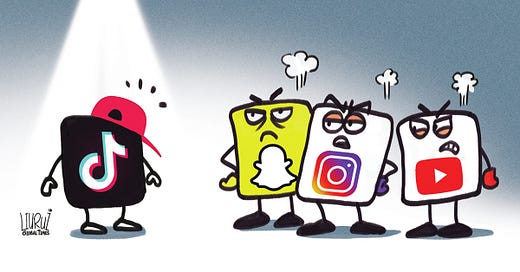Two Years After Trump’s Threats, Silicon Valley Tries to Drive China’s TikTok Out of America.
Worried about the success of TikTok, Meta leads an anti-TikTok campaign full of bad faith and hypocrisy.
What if TikTok was Beijing's false nose? What if the app was capturing Americans' data on behalf of China? What if its powerful content recommendation algorithm allowed the Chinese Communist Party to manipulate American youth? Two years after Donald Trump's failed attempt to force China's ByteDance to sell TikTok, the hostile narrative toward the popula…
Keep reading with a 7-day free trial
Subscribe to Sylvain Saurel’s Newsletter to keep reading this post and get 7 days of free access to the full post archives.




